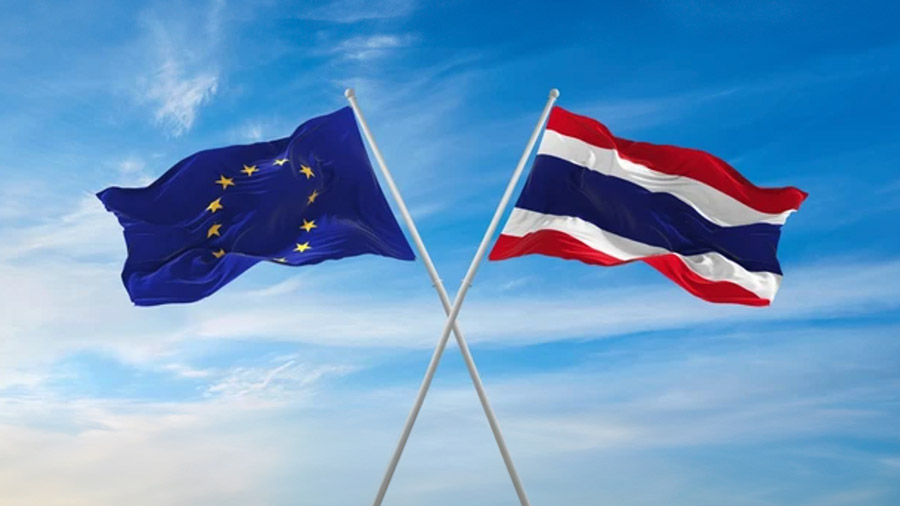Thailand and EU Target 2025 for Free Trade Agreement Completion
Thailand and the European Union (EU) have set their sights on finalizing a highly anticipated free trade agreement (FTA) by 2025, with the fourth round of negotiations scheduled for November 4, 2024. This strategic initiative, relaunched in 2021 after a hiatus following Thailand’s military coup in 2014, aims to bolster economic ties and create opportunities for sustainable development.
The Importance of the Thailand-EU FTA
With the EU ranking as Thailand’s fifth-largest trading partner in 2023, the much-anticipated FTA is poised to play a pivotal role in transforming trade dynamics between the two regions. Total trade reached approximately US$41.6 billion, with Thai exports accounting for US$21.8 billion. Preliminary figures for the first five months of 2024 show a trade total of US$18 billion, reflecting a modest increase of 1.58 percent year-on-year.
Economic Implications and Investment Opportunities
The expected elimination of tariffs and reduction of non-tariff barriers through the FTA will significantly enhance market access for Thai exporters, creating a favorable landscape for foreign direct investment into Thailand. According to the Institute of Future Studies for Development, the FTA could elevate Thailand’s annual economic growth by 1.2 percent, while exports to the EU may increase by 2.83 percent and imports by 2.81 percent.
Key Exports and Imports
- Top 5 Thai Exports to the EU:
- Electrical machinery and equipment: US$5.5 billion
- Nuclear reactors, boilers, machinery: US$4.7 billion
- Vehicles: US$1.7 billion
- Natural or cultured pearls and precious metals: US$1.5 billion
- Optical, measuring, and medical equipment: US$1.7 billion
- Top 5 Thai Imports From the EU:
- Nuclear reactors, boilers, machinery: US$3.1 billion
- Vehicles: US$1.7 billion
- Natural or cultured pearls and precious metals: US$1.5 billion
- Optical, measuring, and medical equipment: US$1.7 billion
Taxation and Regulatory Impact
The proposed FTA also aims to streamline taxation processes by aligning regulatory frameworks between Thailand and the EU. This alignment will not only alleviate administrative burdens but also optimize operational costs, enhancing overall efficiency and compliance for businesses on both sides.
Enhancing Sustainability Standards
Beyond economic gains, the Thailand-EU FTA is committed to championing sustainability. It emphasizes adherence to the EU’s stringent environmental regulations to ensure market access for Thai exporters. Compliance with Sanitary and Phyto-sanitary (SPS) regulations, restrictions on genetically modified organisms (GMO), and good agricultural practices will be required. By aligning with the EU’s standards, Thailand aims to elevate its sustainability benchmarks, contributing to environmental protection and social responsibility.
Promoting a Green Economy
The FTA supports Thailand’s Bio-Circular-Green (BCG) initiative, encouraging shifts toward sustainable production methods and an integrated green economy. As Thailand works to transition to greener practices, the FTA will facilitate innovation and introduce comprehensive Trade and Sustainable Development (TSD) provisions. These measures ensure a deep commitment to worker protections and environmental sustainability.
Addressing Economic Recovery Challenges
Thailand’s pursuit of free trade agreements comes at a crucial time as the nation grapples with a slow economic recovery post-COVID-19. The country’s economy grew by just 1.9 percent in the first half of 2024, lagging behind neighbors such as the Philippines, Vietnam, Malaysia, and Indonesia. Experts emphasize that diversifying trade partnerships through FTAs is essential for stimulating economic growth and resilience in the face of global challenges.
Expert Insights
According to Dr. Piyush Ranjan, an economics professor at Thammasat University, “The Thailand-EU FTA presents a robust opportunity for Thailand to diversify its economy and reduce dependency on tourism. It is critical for sustainable growth and global competitiveness.” This sentiment underscores the urgency of concluding the FTA swiftly and strategically.
As the upcoming negotiation round approaches, stakeholders from both sides are eagerly eyeing the promising benefits that this partnership could usher in. Investors and businesses are encouraged to stay informed and agile to leverage the potential opportunities arising from the evolving trade landscape.
To learn more about Thailand’s trade initiatives and its implications on the broader economic landscape, visit our detailed articles on [ASEAN Briefing](https://www.dezshira.com), and for additional insights, view the EU’s trade regulations [here](https://ec.europa.eu/trade/).
Your Thoughts Matter
What are your thoughts on the potential benefits of the Thailand-EU free trade agreement? Share your insights in the comments below or engage with us on social media!
This article provides a thorough overview of the upcoming Thailand-EU FTA negotiations, integrates strategic SEO components, and invites reader engagement. It is formatted for clarity with subheadings, lists, and essential hyperlinks to encourage further exploration of the topic.


